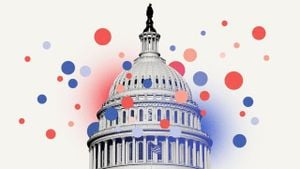Donald Trump will return to the White House in January 2025. Within months of Trump first taking office in 2017, his administration had notified the UN about its intention to withdraw the US from the Paris Agreement. The news of Trump’s re-election has sent shockwaves not only through the United States but across the globe, with many wondering how his second term will shape key areas such as climate action and civil rights.
Known for his unpredictable style and controversial policies, Trump's administration previously exhibited skepticism toward climate change, heavily favoring fossil fuels. This has alarmed climate experts, who fear his return will severely undermine the progress made during the Biden administration. It's understandable; the US, being one of the world’s largest emitters of greenhouse gases, plays a significant role on the global stage when it concerns climate action.
The world is now at another crossroads. Discussions on the impact of Trump's re-election are swirling, particularly with the looming COP29, where numerous pressing issues such as climate finance and carbon markets will come to the forefront. With Biden's term winding down, experts worry about the US delegation’s ability to contribute effectively to negotiations moving forward.
Dialogue Earth reached out to experts from various countries like China, India, and South Africa to grasp the broader ramifications of Trump's re-election.
China's Perspective
According to Yao Zhe, a global policy advisor at Greenpeace East Asia, climate change stands as its own entity, indifferent to political powers. He states, "The loss of US federal climate engagement is a major setback for global governance, but it is not the end of the road." Zhe emphasizes the importance of proactive actions from other nations to keep their populations safe, urging China to re-establish its commitment to the Paris Agreement's goals.
“There’s significant pressure on China to step up when the US might take steps backward,” he notes. “A fortified Nationally Determined Contribution (NDC) from China showing clear motions toward reducing fossil fuel dependence could offer reassurance to the international community.”
Dr. Kevin Mo, principal at the Institute for Global Decarbonization Progress, echoes these sentiments. He highlights the drastically altered geopolitical climate Trump's presidency brings. He mentions concerns over COP29 discussions possibly being hindered due to decreased US influence. “The negotiation topics are certainly challenging, and with the Trump administration potentially vacillitating on overarching climate goals, the result could be catastrophic,” he warns.
India's Reaction
For Sanjay Vashist, director of Climate Action Network South Asia, Trump’s victory carries significant consequences for developing nations. Trump had previously indicated skeptical views toward international climate agreements, and Vashist expresses concern over potential withdrawal from commitments made under such agreements.
“India will need to pursue economic growth without neglecting climate responsibilities, and America’s retreat could complicate global climate efforts. It's more important now than ever to hold nations accountable for their emission goals,” Vashist underlines.
Concerns escalated when experts acknowledged the shifts withdrawing nations may impose on financial flows and investments directed at developing countries. These hurdles could deeply impact India's stride to adopt cleaner technologies.
Global Repercussions and California's Response
Back home, California has already positioned itself as one of the most liberal states opposing Trump’s policies. After Trump's win, California’s Attorney General Rob Bonta stood firm, ready to defend the state's values against expected federal overreach. “If Trump attempts to roll back protections for the environment, immigrants, or LGBTQ+ communities, my office will be prepared to challenge those actions,” Bonta declared.
Governor Gavin Newsom voiced similar sentiments during his announcement of the special legislative session, planned to strengthen the state's defenses against anticipated federal challenges. “Our focus will be on enhancing resources for protecting fundamental rights and civil liberties,” Newsom said, charging legislators to bolster protections for reproductive rights and climate initiatives. With California's impressive record of filing over 100 lawsuits against Trump’s actions during his first term, Bonta and Newsom seem unwavering.
“The track record of the first Trump administration proves we’ll see significant challenges to civil rights and environmental regulations, but California is prepared to fight back,” Gov. Newsom asserted. Many are paying attention to potential impacts on existing state laws aimed at protecting abortion rights and curbing emissions, which could face tough opposition.
The stakes are high, and reactions are pouring in. Major organizations and state leaders across the country are bracing themselves for what they describe could be the stormiest political era yet. Experts predict rapid developments across various sectors, urging both domestic players and international observers to keep their eyes glued on the forthcoming actions out of Washington, particularly with Trump at the helm.
While some sectors like environmental advocates scream for urgency, others feel optimism might survive if cooperation can remain at localized levels, especially with enduring partnerships between states like California and climate-conscious countries like Canada and member nations from the European Union.
Looking Ahead
What remains clear is the expectation for heightened tensions both at home and abroad. For now, groups tackling climate change and social justice know they’ll have to navigate through increasingly turbulent waters. Still, with states like California leading the charge, stakeholders are brimming with determination to protect hard-fought rights.
Achieving greenhouse gas reduction targets, promoting justice for marginalized communities, and defending the environment will not come easy. Yet, as strong voices rise to defend these values, they signal another round of fervent debates on leadership values, rights, and the future direction of America.
Historically, the actions of the US president reverberate far beyond its borders, shaping paths for other nations grappling with their climate commitments. With Trump returning, many are evaluating the anticipated shifts not just for America but for global efforts to combat climate change and uphold civil liberties nationwide and internationally.
The coming months are pivotal; they will determine if collaboration can continue,(because) hurdles have already emerged. Advocates, experts, and even everyday citizens are readying themselves for the waves of change, vowing to remain steadfast even if the path forward feels unpredictable.



